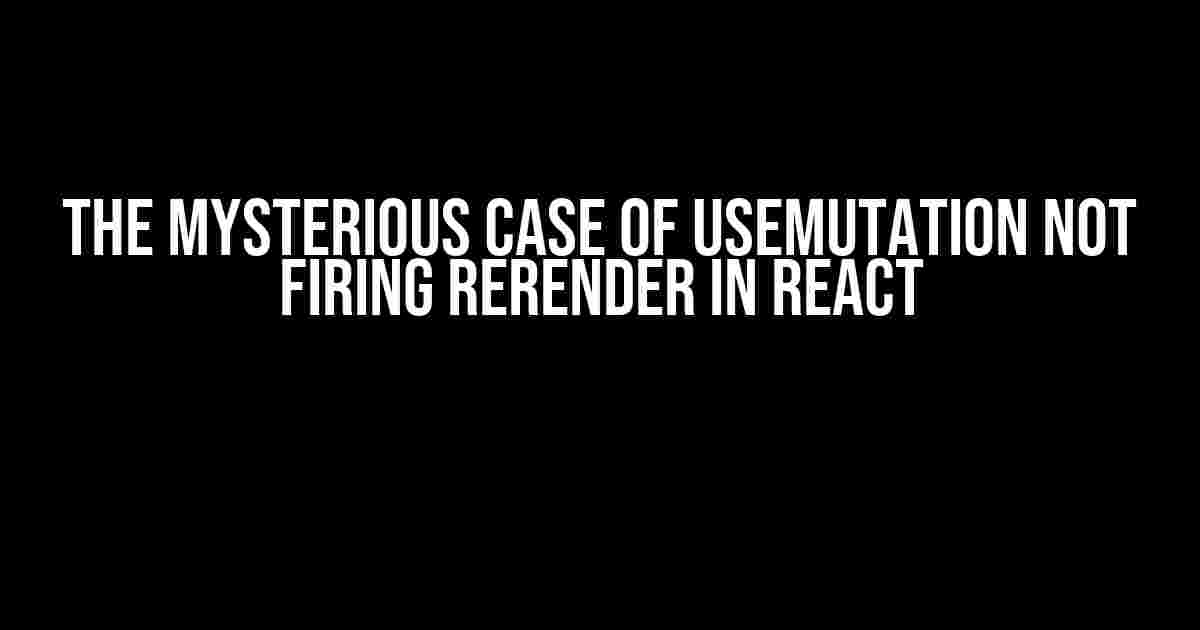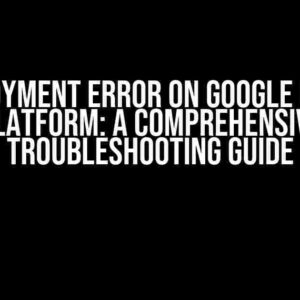Are you stuck in the vortex of frustration, wondering why your React application refuses to rerender when using the useMutation hook from @apollo/client? Fear not, dear developer, for you are not alone in this plight. In this article, we’ll embark on a thrilling adventure to uncover the secrets behind this enigmatic issue and provide you with the solutions to get your application back on track.
The Suspects: Common Causes of the Issue
Before we dive into the solutions, let’s first identify the usual suspects behind this problem. Make sure you’ve checked off these common culprits:
useMutationis not being called inside a React component: Ensure that the hook is being used within a valid React component, as it relies on the component’s lifecycle to function correctly.- Incorrect or missing dependencies: Verify that you’ve passed the correct dependencies to the
useMutationhook, and that they are up-to-date. - Inconsistent caching: Apollo Client’s cache can sometimes interfere with the rerendering process. Try disabling caching or using a different cache policy.
- Competing updates: If multiple updates are being triggered simultaneously, it might prevent the component from rerendering. Use
useCallbackoruseMemoto memoize your mutation function and dependencies.
The Investigation: Understanding the useMutation Hook
To grasp why useMutation doesn’t fire a rerender, we need to understand how it works under the hood.
import { useMutation, gql } from '@apollo/client';
const MUTATION = gql`
mutation CreateItem($name: String!) {
createItem(name: $name) {
id
name
}
}
`;
function CreateItem() {
const [createItem, { data, error, loading }] = useMutation(MUTATION);
if (loading) return Loading...;
if (error) return Error: {error.message};
return (
{data && Item created: {data.createItem.name}
}
);
}
In the above example, the useMutation hook returns an array with three elements:
createItem: The mutation function that triggers the update.{ data, error, loading }: An object containing the mutation’s result, error, and loading state.
When the mutation is executed, Apollo Client updates its cache and notifies React to rerender the component. However, if the rerender doesn’t occur, it might be due to one of the suspects mentioned earlier.
The Solutions: Fixing the Rerender Issue
Now that we’ve identified the potential causes and understand how useMutation works, let’s dive into the solutions:
Solution 1: Memoize the Mutation Function
Wrap your mutation function with useCallback to memoize it and prevent unnecessary re-renders:
import { useCallback } from 'react';
import { useMutation, gql } from '@apollo/client';
const MUTATION = gql`
mutation CreateItem($name: String!) {
createItem(name: $name) {
id
name
}
}
`;
function CreateItem() {
const [createItem, { data, error, loading }] = useMutation(MUTATION);
const memoizedCreateItem = useCallback(() => {
createItem({ variables: { name: 'New Item' } });
}, [createItem]);
return (
{data && Item created: {data.createItem.name}
}
);
}
Solution 2: Update Dependencies Correctly
Ensure that you’re passing the correct dependencies to the useMutation hook:
import { useMutation, gql } from '@apollo/client';
const MUTATION = gql`
mutation CreateItem($name: String!) {
createItem(name: $name) {
id
name
}
}
`;
function CreateItem() {
const [createItem, { data, error, loading }] = useMutation(MUTATION, {
variables: { name: 'New Item' },
update: (cache, { data }) => {
cache.modify({
fields: {
items: (existingItems = []) => [...existingItems, data.createItem],
},
});
},
});
return (
{data && Item created: {data.createItem.name}
}
);
}
Solution 3: Disable Caching or Use a Different Cache Policy
Apollo Client’s cache can sometimes interfere with the rerendering process. Try disabling caching or using a different cache policy:
import { ApolloClient, InMemoryCache } from '@apollo/client';
const client = new ApolloClient({
uri: 'https://your-graphql-api.com/graphql',
cache: new InMemoryCache({
typePolicies: {
Query: {
fields: {
items: {
merge: (existing, incoming) => [...existing, ...incoming],
},
},
},
},
}),
});
Solution 4: Use useQuery Instead of useMutation
In some cases, you might be able to use useQuery instead of useMutation. If you’re performing a query that updates the cache, consider using useQuery with the refetch option:
import { useQuery, gql } from '@apollo/client';
const QUERY = gql`
query GetItems {
items {
id
name
}
}
`;
function GetItems() {
const { data, error, refetch } = useQuery(QUERY, {
refetch: true,
});
if (error) return Error: {error.message};
return (
{data && (
{data.items.map((item) => (
- {item.name}
))}
)}
);
}
Conclusion: Solving the useMutation Rerender Mystery
By now, you should have a solid understanding of why useMutation might not be firing a rerender in your React application, and how to fix it using the solutions outlined above. Remember to:
- Check for common culprits such as incorrect dependencies or caching issues.
- Memoize your mutation function to prevent unnecessary re-renders.
- Update dependencies correctly to ensure the mutation is triggered correctly.
- Disable caching or use a different cache policy if necessary.
- Consider using
useQueryinstead ofuseMutationif possible.
With these solutions in your toolkit, you’ll be well-equipped to tackle the mysterious case of useMutation not firing a rerender in React. Happy debugging!
| Solution | Description |
|---|---|
| Memoize the Mutation Function | Wrap the mutation function with useCallback to memoize it. |
| Update Dependencies Correctly | Pass the correct dependencies to the useMutation hook. |
| Disable Caching or Use a Different Cache Policy | Apollo Client’s cache can interfere with the rerendering process. |
| Use useQuery Instead of useMutation | Consider using useQuery with the refetch option. |
Frequently Asked Question
Get answers to the most frequently asked questions about “useMutation does not fire rerender React” and unlock the secrets to a smoother React experience!
Q1: Why doesn’t my component rerender when I update the state using useMutation?
When you update the state using useMutation, React doesn’t automatically trigger a rerender. This is because useMutation returns a tuple containing a mutate function and an object with a data property. The mutate function updates the state, but it doesn’t trigger a rerender. You need to use the returned data property to update your component’s state or props, which will then trigger a rerender.
Q2: How can I force a rerender after calling useMutation?
One way to force a rerender after calling useMutation is to use the setState function to update your component’s state. This will trigger a rerender of your component with the updated state. You can also use React’s built-in useReducer hook to manage your state and trigger rerenders when the state changes.
Q3: Why does useMutation return a promise instead of triggering a rerender?
useMutation returns a promise because it allows you to handle the mutation result in a more flexible way. By returning a promise, you can chain multiple mutations together, handle errors and loading states more easily, and even cancel ongoing mutations. This design decision also enables more advanced use cases, such as optimistic updates and retrying failed mutations.
Q4: Can I use useMutation with React Hooks to trigger a rerender?
Yes, you can use useMutation with React Hooks to trigger a rerender. For example, you can use the useState hook to create a state variable and update it when the mutation is successful. You can then use the useEffect hook to trigger a rerender when the state changes. This way, you can decouple the mutation logic from the rendering logic and make your code more modular and reusable.
Q5: Are there any alternatives to useMutation that trigger a rerender automatically?
Yes, there are alternatives to useMutation that trigger a rerender automatically. For example, you can use the useQuery hook from React Query, which returns a cached value and automatically triggers a rerender when the data changes. You can also use the useSWR hook from SWR, which returns a cached value and automatically triggers a rerender when the data changes. These hooks provide a more seamless experience for handling data fetching and mutations in React.



